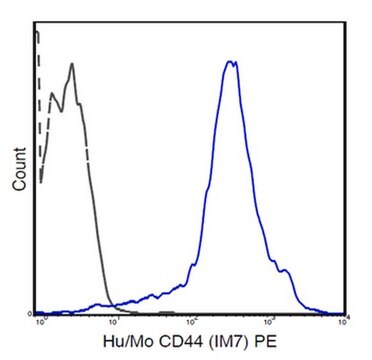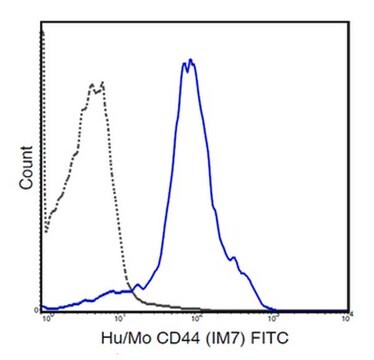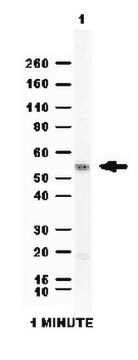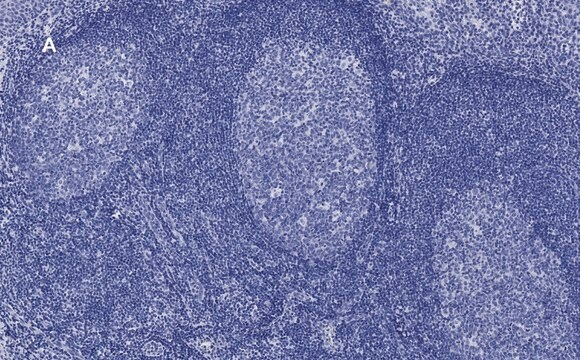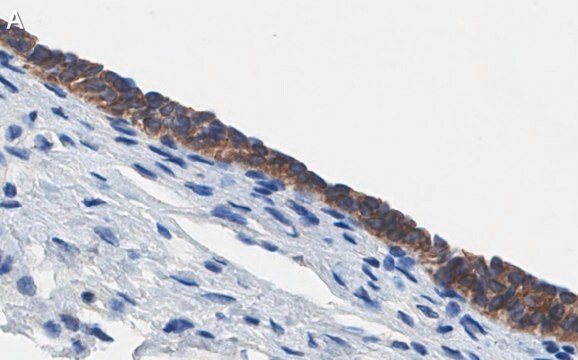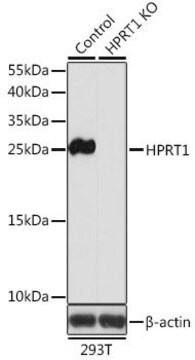SAB4700182
Monoclonal Anti-CD44-FITC antibody produced in mouse
clone MEM-85, purified immunoglobulin, buffered aqueous solution
Sinonimo/i:
Anti-Pgp-1
Autenticatiper visualizzare i prezzi riservati alla tua organizzazione & contrattuali
About This Item
Codice UNSPSC:
12352203
NACRES:
NA.44
Prodotti consigliati
Origine biologica
mouse
Livello qualitativo
Coniugato
FITC conjugate
Forma dell’anticorpo
purified immunoglobulin
Tipo di anticorpo
primary antibodies
Clone
MEM-85, monoclonal
Stato
buffered aqueous solution
Reattività contro le specie
human
tecniche
flow cytometry: suitable
Isotipo
IgG2b
N° accesso NCBI
N° accesso UniProt
Condizioni di spedizione
wet ice
Temperatura di conservazione
2-8°C
modifica post-traduzionali bersaglio
unmodified
Informazioni sul gene
human ... CD44(960)
Descrizione generale
The CD44 (cell-surface glycoprotein) gene with 20 exons is mapped to human chromosome 11p13. The gene codes for a transmembrane glycoprotein.
The antibody MEM-85 reacts with both cell surface-expressed and soluble form of CD44 antigen (Phagocyte glycoprotein 1), a 80-95 kDa transmembrane glycoprotein (hyaladherin family) present on the most of cells and tissues (leukocytes, endothelial cells, mesenchymal cells, etc.); it is negative on platelets and hepatocytes.
Immunogeno
Leukocytes of a patient suffering from LGL Type Leukaemia.
Applicazioni
Monoclonal Anti-CD44-FITC antibody produced in mouse has been used as a reagent to distinguish HeLa (cancer) cells from chondrocyte (normal) cells.
The reagent is designed for Flow Cytometry analysis of human blood cells using 20 μL reagent / 100 μL of whole blood or 1e6 cells in a suspension. The content of a vial (2 mL) is sufficient for 100 tests.
Azioni biochim/fisiol
CD44 (cell-surface glycoprotein) is involved in cell-cell and cell-extracellular matrix interactions. It plays an important role in lymphocyte homing and lymphocyte activation. It also acts as a metastasis suppressor gene for prostatic cancer. Overexpression of CD44 leads to esophageal squamous cell carcinoma (ESCC). CD44 inhibits macrophage multinucleation by interacting with its ligands, hyaluronic acid, chondroitin sulfates and osteopontin. 100kDa form of CD44, facilitates the binding of poliovirus to HeLa cells. In addition, it also implicated in the infection of mononuclear phagocytes by human immunodeficiency virus (HIV).
Caratteristiche e vantaggi
Evaluate our antibodies with complete peace of mind. If the antibody does not perform in your application, we will issue a full credit or replacement antibody. Learn more.
Stato fisico
Solution in phosphate buffered saline containing 15 mM sodium azide and 0.2% high-grade protease free BSA as a stabilizing agent.
Esclusione di responsabilità
Unless otherwise stated in our catalog or other company documentation accompanying the product(s), our products are intended for research use only and are not to be used for any other purpose, which includes but is not limited to, unauthorized commercial uses, in vitro diagnostic uses, ex vivo or in vivo therapeutic uses or any type of consumption or application to humans or animals.
Non trovi il prodotto giusto?
Prova il nostro Motore di ricerca dei prodotti.
Codice della classe di stoccaggio
10 - Combustible liquids
Classe di pericolosità dell'acqua (WGK)
WGK 2
Punto d’infiammabilità (°F)
Not applicable
Punto d’infiammabilità (°C)
Not applicable
Scegli una delle versioni più recenti:
Possiedi già questo prodotto?
I documenti relativi ai prodotti acquistati recentemente sono disponibili nell’Archivio dei documenti.
Fabrication and modification of dual-faced nano-mushrooms for tri-functional
cell theranostics: SERS/fluorescence signaling, protein targeting, and drug
delivery?
Hsieh H Y
Journal of Materials Chemistry, 22, 20918?20928-20918?20928 (2012)
Musashi-1 promotes a cancer stem cell lineage and chemoresistance in colorectal cancer cells.
Chiou GY
Scientific Reports, 7 (2017)
CD44 occupancy prevents macrophage multinucleation.
Sterling H
The Journal of Cell Biology, 143, 837-847 (1998)
Autophagy supports generation of cells with high CD44 expression via modulation of oxidative stress and Parkin-mediated mitochondrial clearance
Whelan KA
Oncogene, 36, 4843-4858 (2017)
Guang-Yuh Chiou et al.
Scientific reports, 7(1), 2172-2172 (2017-05-21)
Colorectal cancers (CRCs) are a critical health issue worldwide. Cancer stem cell (CSC) lineages are associated with tumour transformation, progression, and malignant transformation. However, how lineages are transformed and how chemoresistance is acquired by CRCs remain largely unknown. In this
Global Trade Item Number
| SKU | GTIN |
|---|---|
| SAB4700182-100TST | 4061832706344 |
Il team dei nostri ricercatori vanta grande esperienza in tutte le aree della ricerca quali Life Science, scienza dei materiali, sintesi chimica, cromatografia, discipline analitiche, ecc..
Contatta l'Assistenza Tecnica.